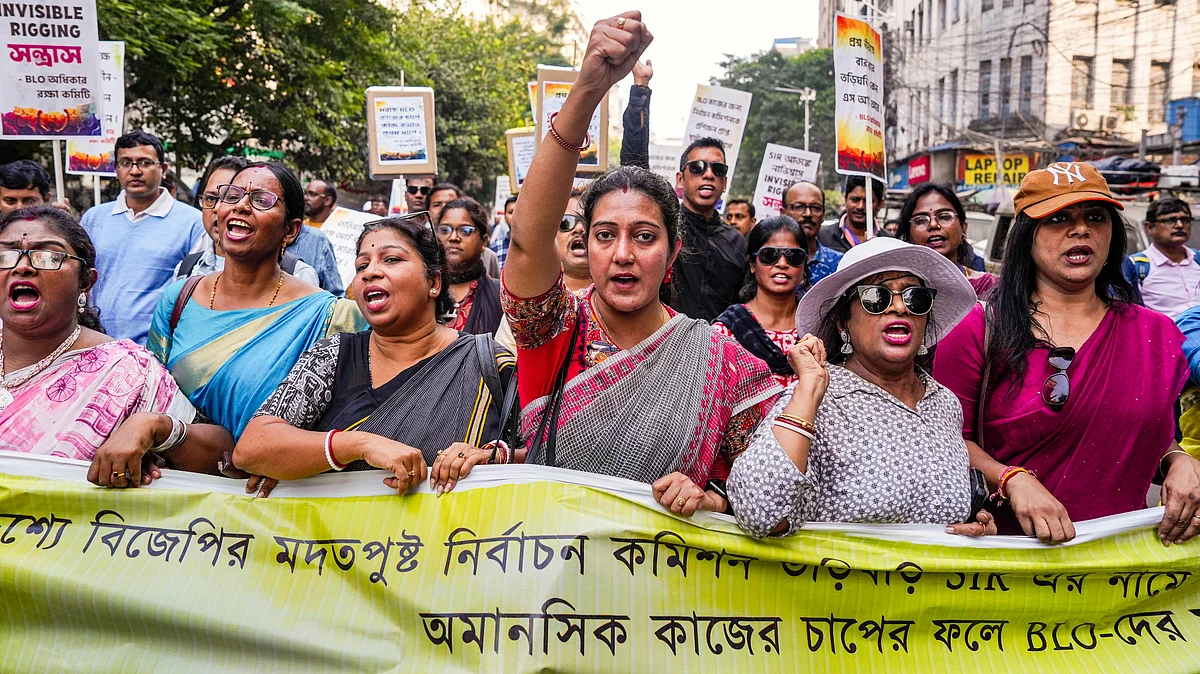Bengal SIR: Row builds over outsourced data-entry staff, booths in pvt premises
Latest dispute triggered by CEO’s move to contractually hire over 1,000 outsourced data-entry and software developers

The Special Intensive Revision (SIR) of electoral rolls in West Bengal has now become entangled in a widening web of controversy, as the Election Commission of India’s (ECI) decision to outsource data-entry work collides with parallel allegations over the proposed use of private premises as polling booths.
What began as a routine update of the voters’ list has steadily transformed into a political stand-off between the state government and the office of the state's Chief Electoral Officer (CEO), raising questions about transparency, neutrality and control over the most basic structures of the electoral process.
At the centre of the latest dispute is the CEO’s quiet move to hire around a thousand outsourced data-entry operators and several dozen software developers on a one-year contract, ostensibly to meet the heavy digitisation workload under the SIR.
This outsourcing push followed a circular from the CEO’s office instructing district election officers, block development officers and electoral registration officers not to use the contractual data-entry operators already working under them — including Bangla Sahayata Kendra staff — for uploading and digitising voter forms.
The ECI subsequently emphasised that contractual staff cannot be engaged in such core electoral work, and warned that field-level officers who violated these instructions could face consequences.
However, the state government, led by chief minister Mamata Banerjee, has treated the decision with deep suspicion. In a strongly worded letter to the ECI, Banerjee questioned why the CEO was taking over functions traditionally handled by district offices, especially when those offices already employ trained data-entry personnel.
Her letter went further, openly wondering whether the outsourcing was being undertaken for partisan reasons. The timing and manner of the move, she argued, “raise legitimate doubts” — a thinly veiled reference to the BJP’s growing involvement in the SIR process. The fact that the proposal reportedly awaits state finance department approval has only intensified the war of words, with Banerjee insisting that basic electoral work should not be shifted to outside agencies with no established accountability.
The controversy has been amplified by the ECI’s parallel experiment of inviting political parties to “suggest private premises” that could be converted into polling stations — a move that triggered immediate backlash in the state.
The idea, first raised during a meeting earlier this month, was presented as a way to reduce overcrowding in government facilities and bring voting centres closer to residents. But Opposition parties and the state government warned that holding polls in private homes, offices or buildings would open the door to intimidation, partisan influence, and loss of public trust. Banerjee argued that the proposal was unprecedented and dangerous, asking whether the Commission intended to turn the polling process into a “private fiefdom controlled by favoured individuals”.
Together, the outsourcing decision and the private-premises proposal have created the impression of a broader shift in who controls the mechanics of elections in West Bengal. On one hand, digitisation work is being lifted out of the hands of the district machinery and placed into the laps of external agencies selected through a tender process the state has no oversight over.
On the other, the physical sites of polling — long treated as neutral, public spaces — risk migration into privately owned, potentially partisan environments. This convergence of concerns has enabled the ruling Trinamool Congress to argue that the neutrality of the electoral administration is being eroded piece by piece.
Meanwhile, the ECI maintains that its decisions are driven only by administrative efficiency and compliance with its own guidelines. It has noted that districts cannot use contractual staff for core electoral tasks and that additional manpower is required to meet SIR deadlines. It has also insisted that the option of private premises is merely exploratory and subject to safeguards.
Yet on the ground, field officers describe intense pressure to meet digitisation targets even as they are barred from using the staff who normally support such operations. Booth-level officials, already burdened with verification work, say the absence of existing data-entry teams has slowed the workflow and made the SIR timeline more difficult to meet.
The outsourcing tender and the debate over private polling sites therefore feed into the same anxiety: that the structures of election management are shifting under their feet, without clear coordination or justification.
What was meant to be a procedural exercise in revising voter lists has thus evolved into a clash over the very architecture of electoral administration in West Bengal. The dispute is no longer merely about forms and databases. It now encompasses the location of polling booths, the nature of election staffing, the balance between state and Central oversight, and the public’s ability to trust the neutrality of processes that sit at the heart of democratic legitimacy. The SIR continues, but under a cloud of mistrust that shows no sign of lifting.
Follow us on: Facebook, Twitter, Google News, Instagram
Join our official telegram channel (@nationalherald) and stay updated with the latest headlines
